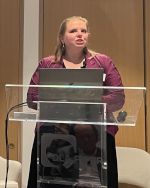In partnership with The Fintech Times, global law firm DLA Piper opened the doors to its offices in Barbican, London for an insightful evening event with industry experts exploring how the insurance sector is embracing a ‘digital revolution’.
New technologies are transforming the insurance industry and disrupting the existing ecosystem. As an ever-increasing number of insurtechs emerge, so too has artificial intelligence (AI) – with the potential to change the way insurance firms work forever.
With these points in mind, six industry experts took to the DLA Piper stage – discussing embedded insurance; new methods of insurance distribution; partnerships within the industry; regulatory trends; AI and other hot topics.
Care advised for insurers for partnerships and AI

Following an introduction by Pierre Berger, partner, head financial services and insurance sector Belgium at DLA Piper, Aline Kiers, senior associate at DLA Piper Netherlands, continued proceedings with a first talk on the ‘dos and don’ts for a successful partnership in the insurtech sector‘.
As the buzz around AI grows, specifically surrounding OpenAI‘s new chatbot, Kiers warned users to be wary: “Very differently from me, ChatGPT is able to deliver a 10-minute script within seconds. It also seemed to know you, the market, by using key buzzwords to make it sound interesting.
“But, having a closer look at what it made for me, I noticed ChatGPT was not aware of the regulatory framework.”

While discussing partnerships in the space, Kiers also explained the importance of communicating your differences: “While it’s good to use each other’s unique selling points and technical capabilities, please do not relinquish your own competitive advantages. As such, consider IP ownership or locking periods.”
“Also it is very important to acknowledge that a partner and the insurer can be very different in size, flexibility and risk aversion.
“If these differences are not acknowledged from the start, and cannot be overcome in the negotiation space, it might be good to reconsider the partnership completely. Breaking off arrangements often goes easier if you have communicated your differences from the start. Don’t forget the basics,” Kiers concluded.
The importance of the startup ecosystem

Ant Barker, head of venture investments and partnerships at multinational insurance provider Aviva, touched on innovation in the space, investing in and collaborating with startups and how AI could prove to be game-changing.
“We try to stay ahead of some of the emerging customer and technology trends and we embed ourselves in the startup ecosystem to do that.
“This is mutually beneficial because we learn a lot from early-stage businesses, but we think we can add a lot of value to them on their journey – either by bringing expertise from our functions or access to distribution.”
Barker also discussed his view on the potential for AI: “It seems like AI should be a game-changer, particularly in customer services or marketing, where can automate things like FAQs or augment our customer service teams and how they change customers’ policies”.
“[With AI] we’re currently proceeding with some caution and effectively looking for the best use cases, and where we can apply this type of technology,” Ant concluded.
Embedded insurance orchestration

Jean-Charles Velge, co-founder of digital insurance provider Qover, gave a speech on the concept of embedded insurance orchestration.
“What’s important to understand is that insurance, especially enterprise insurance, is not one size fits all. Everybody needs different products, everybody has different clients and support.”
JC Velge also discussed what the insurtech had offered global bike manufacturer Canyon, regarding embedded insurance: “When you go on their website and you configure your bike, then they offer you an insurance policy. There is one button to click on to get insurance into your cart to purchase, with the relevant insurance contract directly. The bike dealer, Canyon, only had to do one API integration to offer insurance across all different geographies.”
‘Augmented humanity’
Axel Maier is partner and global head of business development at MDOTM Ltd, which develops AI-driven investment solutions. He asked, and answered, what it takes to make AI work in investments.

“We manage money for insurance companies, we also make our technology – artificial intelligence – available for our clients. This methodology has a name, ALICE: Adaptive Learning in Complex Environments.”
“Financial markets become more complex every day. Having information is not a problem anymore. Selecting information and making sense of it is the issue. Ninety per cent of all the data that exists today has been generated in the last two years. This is not going to change – it’s an exponential development. AI is able to help with that.”
Many have recognised with the launch of various AI tools in recent months, AI can support our work but cannot always be trusted completely to produce the perfect desired end result. Maier stressed the importance of back-and-forth dialogue with AI to gain desired outcomes for investors.
“If you want to use AI for the investment side, it has to adapt to you, what you want and what you need. Importantly, AI learns and can react to the market much quicker than humans can.”
“Openness and being willing to engage with what AI can do, question it and not follow it blindly, but having it can help. There would not have been a vaccine against covid in one year without AI. It enhances, but it doesn’t replace what we do. It offers augmented humanity, hence not replacing us but helping us.”

AI in insurance: panel discussion
Concluding the event Anthony Day, global head of fintech and insurtech at DLA Piper in London, moderated a panel discussion, touching on the key themes that dominated the evening on insurance.
Kiers offered her knowledge and views on upcoming regulation of AI specifically in the insurance space: “EIOPA, the European authority for insurance, is already acknowledging that AI is here to stay in the insurance sector. It also points out certain challenges. But the sector has a robust framework that can manage those risks.
“If you use AI, you should comply with UN Human Rights. Regarding Solvency II, you have to act in the best interest of your client. EIOPA clearly says that when using AI, you must comply with this.”
“[Regarding the AI act], it is currently up for debate whether the insurance sector should be a separate category as a high-risk category. EIOPA suggests that it should not be categorised separately in the AI act as it believes it already has the robust framework to rely on.”
Ant Barker also acknowledged the difficulties for early-stage businesses due to a difficult economic landscape and recent political developments. Despite a period of caution last year that appears to have continued into 2023, Barker explained why there are reasons to be positive.
“Ultimately, there’s always going to be amazing entrepreneurs out there building the brilliant businesses of the future and these will get investment. It’s an exciting time to be an investor coming into this year. We saw big tech laying off thousands of people and a good chunk of those will go and start new interesting businesses. The good ones will get funded – it won’t be easy, but there is capital there to be deployed.”


